|
|
|
Sort Order |
|
|
|
Items / Page
|
|
|
|
|
|
|
| Srl | Item |
| 1 |
ID:
129442
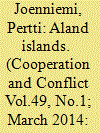

|
|
|
|
|
| Publication |
2014.
|
| Summary/Abstract |
The Åland Islands received their co-sovereign standing from the League of Nations in 1921, the settlement of a Finnish-Swedish dispute. The clash was over ownership, and the league advocated that Åland should remain part of Finland, albeit elevated to the status of a self-governing polity. The verdict implied that Finland's sovereignty was significantly compromised, whereas the islands landed in an in-between situation, being neither local nor fully sovereign. The duality of Åland - remaining an integral part of Finland yet still distinct with a standing of its own, including various cultural and linguistic safeguards - meant more generally that the islands fall through the interstices of the dominant discourses pertaining to political space. However, the lack of any clear conceptual standing has not amounted to anything profoundly disadvantageous. Their liminal nature of being neither this nor that has instead furnished the islands with a rather favourable posture. Their standing, although initially perceived as a loss and still seen in some interventions as unwarranted and viewed as a source of ontological uncertainty, arguably accounts for their ability to transform what usually appears as weakness into a considerable degree of influence. The article thus aims to explore what explains such an outcome and the manner in which the ambiguity of the islands has stood the test of time, taking into account that their standing has, among other things, been impacted by Finland and the islands both joining the EU in 1995 and the sovereignty games involved.
|
|
|
|
|
|
|
|
|
|
|
|
|
|
|
|
| 2 |
ID:
166783
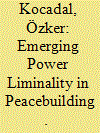

|
|
|
|
|
| Summary/Abstract |
International peacebuilding is no longer dominated by Western actors and their liberal peace framework, neither there is a full-fledged alternative formulated by emerging peacebuilding actors. In this paper, I first establish the relationship between the liminality of emerging powers and their mimicry of the liberal peace. Secondly, I distinguish three forms of mimicry in peacebuilding that stem from emerging power liminality: a discursive mimicry, a complete mimicry and a substantive mimicry. In the case of the discursive mimicry, there is a liberal peacebuilding discourse which is rarely substantiated with policies. The complete mimicry is when both the liberal discourse and the policies are mimicked, and the substantive mimicry is a genuine adaptation of the liberal peacebuilding by the emerging power. The case of Turkish peacebuilding is analysed to illustrate the tripartite distinction. I demonstrate that Turkey mimics solely the discourse of the democratic peace thesis, while there is a complete mimicry of the Western model in security sector reform. However, the Turkish civil society peacebuilding and Turkey’s approach to economic development substantively mimic their liberal peace counterparts. This article contributes to the critical literature on liberal peacebuilding by identifying the different forms of emerging actors’ mimicry of the liberal peace.
|
|
|
|
|
|
|
|
|
|
|
|
|
|
|
|
| 3 |
ID:
110861
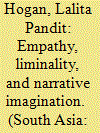

|
|
|
|
|
| Publication |
2012.
|
| Summary/Abstract |
This essay focuses on the motif of symbolic death in Rabindranath Tagore's'The Living and the Dead' to explore how social injustices occur when empathy for an individual (or a group) is blocked. Arnold Van Gennep's notion of pre-liminal, liminal and post-liminal rites of passage that situate humans in efficacious, productive social relations, is used to contextualise the liminality motif in appropriate theoretical terms, while the introductory and ending references to Martha Nussbaum's idea that literary texts serve to unblock empathy (for the reader), by making invisible pain and suffering visible, draw attention to Tagore's contribution to this kind of humanising literature, and his relevance as an important literary figure in today's world.
|
|
|
|
|
|
|
|
|
|
|
|
|
|
|
|
| 4 |
ID:
151184
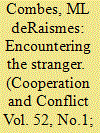

|
|
|
|
|
| Summary/Abstract |
Since 9/11, the rise of Islamist extremism has taken hold of the national imagination as the greatest threat facing the USA. The 2013 Boston Marathon bombing seemed to add a new chapter to the War on Terror with the ‘introduction’ of homegrown terrorists who wantonly kill innocent Americans, just as the 19 hijackers did. They are evil. Yet, the narrative of the Tsarnaevs that emerged shortly after the attack crafted a far more ambiguous relationship to these threatening bodies. What allows for such ambiguity, given the Tsarnaevs’ murderous acts? In this article, I look at how identity demarcation was used directly after the bombing as a form of securitization, paying particular attention to the role of the stranger. Contributing to both identity and ontological security theory, I argue that analyzing the discursive (re)presentation of the liminal and its mediation between inclusion and exclusion best captures the multifaceted nature of security, which includes both ontological and material well-being. I show that the particular manner in which the stranger shows up in the portrayal of the Boston attack helps steer American identity practice(s) down specific paths of meaning-making that are not as clear-cut as ‘righteous Self’ versus ‘evil Other.’
|
|
|
|
|
|
|
|
|
|
|
|
|
|
|
|
| 5 |
ID:
144351
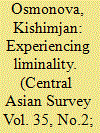

|
|
|
|
|
| Summary/Abstract |
This article is intended to contribute broadly to research in post-socialist urban studies. Based on ethnographic fieldwork and interviews with ‘newcomers’ to the capital, Astana, from different parts of Kazakhstan, I examine the renting practices of newcomers. I analyse the experiences of newcomers in their new urban milieu of Astana, and try to answer the question of what it means to live in the city for various groups of individuals on a daily basis. I examine the Soviet and post-Soviet housing and the continuities of the Soviet legacy when it comes to the institution of propiska (city registration). I show that living in shared flats is a coping strategy to deal with expensive rents and meant to be a transitory step towards homeownership. For this reason many accept high rents and crowded housing as ‘normal’. Furthermore, I argue that informal renting practices are acceptable mostly for young and single people, who are free to experiment with city life, and are on their way to establishing careers and personal lives. However, elderly newcomers and young families with children who do not wish to live in shared flats, but have to rent, feel ‘homeless’ and trapped in ‘liminal housing’. For them, renting is undesirable, and they feel a sense of incarceration if they fail to secure housing.
|
|
|
|
|
|
|
|
|
|
|
|
|
|
|
|
| 6 |
ID:
143332
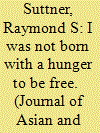

|
|
|
|
|
| Summary/Abstract |
There is a stark contrast between Nelson Mandela the freedom fighter and the young man who grew up in rural Transkei without a ‘hunger to be free’. Until entering Johannesburg in 1941, he generally did not recognise or resist white oppression. Mandela was destined to be counsellor to the future abaThembu king, not a leader himself. Nevertheless, he encountered discordant notes, suggesting that he could not be a man as long as Africans were a conquered people. His consequent transition to manhood remained unresolved until his involvement in the defiance of the apartheid regime, which signified the attainment of his manhood that had been denied to him in earlier life.
|
|
|
|
|
|
|
|
|
|
|
|
|
|
|
|
| 7 |
ID:
152482
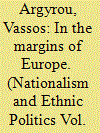

|
|
|
|
|
| Summary/Abstract |
This article argues that Greek Cypriot nationalism has been in large part motivated by the misconceived idea of Cyprus becoming a modern, European society. Although Cyprus joined the European Union in 2004, the perception of it by the European north as a culturally marginal Mediterranean society had not changed. This was amply demonstrated in 2013 when Cyprus applied to the EU for urgent financial assistance. It was forced to capitalize its banks through their customers' savings and, although this and other “corrective” measures were couched in seemingly rational economic terms, they were unmistakably a punishment and a civilizational lesson.
|
|
|
|
|
|
|
|
|
|
|
|
|
|
|
|
| 8 |
ID:
188745


|
|
|
|
|
| Summary/Abstract |
This essay offers an introduction to a special section on ecology and performance in South Asia. Aiming at ‘green’ studies of music and performance, this collection explores intersections between ethnography, history, eco- and ethnomusicology, and film and performance studies by paying particular attention to the ecological turn more broadly visible in South Asian studies. The papers address varied ecological settings of South Asian music and performance, from riverscapes to coastal communities, and from the locations of instrument-makers to negotiations of the climate crisis and the COVID-19 pandemic. The novelty of the section lies not just in mapping the dialogism between ecology and music through reflections on liminality, gender, resistance and identity, but also in bringing forth new archival strategies (digitisation and digital cultures) in conversation with ethnographic findings.
|
|
|
|
|
|
|
|
|
|
|
|
|
|
|
|
| 9 |
ID:
170723
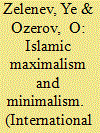

|
|
|
| 10 |
ID:
174705
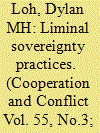

|
|
|
|
|
| Summary/Abstract |
Sovereignty is the core concept of international relations. Almost without exception, approaches to sovereignty in IR have followed a binary framing where sovereignty is seen to consist of two components: ‘internal’ versus ‘external’ sovereignty, ‘positive’ versus ‘negative’ sovereignty, and so on. These dichotomies stem from the prevailing understanding of sovereignty as the boundary between the inside and the outside of the state. This article builds on and expands these existing approaches by reconceptualizing the sovereign border line as a liminal border space. Relatedly, we theorize the concept of liminality in greater depth by distinguishing between four distinct kinds of liminality: marginal, hybrid, interstitial, and external. Each of these problematizes the dividing line of sovereignty in unique but comparable ways. We empirically illustrate these four kinds of liminality with reference to contested states, ‘tribal’ or ‘indigenous’ groups, NGOs such as Amnesty International, and extremist groups such as ISIS, respectively. Each of these types of liminality entails unique actors, practices, and consequences for the concept of sovereignty. We suggest that liminal sovereignty practices represent the most radical source of change for the concept of sovereignty, yet at the same time, somewhat counterintuitively, they also serve as the best means of clarifying existing, established meanings and practices of sovereignty.
|
|
|
|
|
|
|
|
|
|
|
|
|
|
|
|
| 11 |
ID:
186344
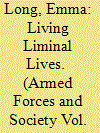

|
|
|
|
|
| Summary/Abstract |
The emotional cycle of deployment theorized by Logan and adapted by Pincus, House, Christenson, and Alder is often applied by academics and military support agencies to define, explain, and provide advice on the experiences and possible emotional reactions of military families during phases of deployment. Interviews with army partners showed that spatiotemporal experiences and perspectives are more complex than those afforded by the emotional cycle of deployment. This article argues that applying the concept of liminality uncovers some of this complexity, illuminating the in-between times experienced during deployments that are otherwise hidden. Army partners move through and between deployments and deployment phases haunted by specters of past and future deployments. By disrupting seemingly chronological and discrete spatiotemporal narratives, which often frame research on military families and deployment, this article demonstrates how army partners move through and between deployments and deployment stages negotiating past and future deployments. It shows how they continuously adapt and evolve practices while negotiating interpreted pasts and imagined futures in pursuit of becoming “ideal.”
|
|
|
|
|
|
|
|
|
|
|
|
|
|
|
|
| 12 |
ID:
188747
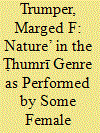

|
|
|
|
|
| Summary/Abstract |
I discuss the treatment of the theme of nature in ṭhumrī by some female exponents of the Pūrab Aṅg (eastern style) in the various contexts where these artists were and are active, especially in the phase of transition from the style of hereditary performers to a new middle-class style of ṭhumrī. I elaborate on how courtesans have turned the rendition of these themes into one of their tools of covert resistance, given their default liminality and their marginalisation in the early twentieth century, and have later passed on this strategy to some non-hereditary women, who have adapted it to the bourgeois urban context maintaining its liminal features.
|
|
|
|
|
|
|
|
|
|
|
|
|
|
|
|
| 13 |
ID:
181422
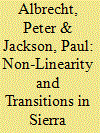

|
|
|
|
|
| Summary/Abstract |
This article explores how transitions produce non-linearity in Sierra Leone’s security and justice programming, as it unfolded from the late 1990s and onwards starting in open conflict. Transitions have received limited detailed analytical consideration in the literature on interventions because they are mundane and inevitable, and therefore taken for granted. However, they definitively condition how programmes evolve. We show that transitions can be seemingly small as well as comprehensive, but commonly have unpredictable, hidden and often unmanageable transformative effects on the trajectory of security and justice programmes. To conceptualize the logic of transitioning, ritual theory – and specifically liminality that is a central component of rites of passage – is used to capture the inherent diffuseness and unpredictability of transitioning. Transitions in programming are liminal moments, ‘neither here nor there’, and as such characterized by ambiguity and indeterminacy. The ambiguity, and importance, of transitions stems from their potency to disturb the direction of programming, requiring the suspension of routine, which internationally funded programming is notoriously ill-suited to deal with. Empirically, the article looks at three types of transitions in Sierra Leone: (1) war to peace; (2) turnover of staff; and (3) elections leading to change of the party in power.
|
|
|
|
|
|
|
|
|
|
|
|
|
|
|
|
| 14 |
ID:
186846
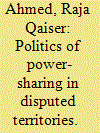

|
|
|
|
|
| Summary/Abstract |
The proper functioning of the government and administration of Azad Jammu and Kashmir (AJK) is taken care of by Pakistan through the successive installment of courts and a series of acts that inter alia include the 1962 Act, the 1970 Act, and the Interim Constitution Act 1974. This paper discusses power-sharing arrangements in AJK, and makes connections to asymmetrical federalism and liminality. It further dissects the matrix of the 13th amendment in the constitution of Azad Kashmir and how it changed the nature of the relationship between AJK and Pakistan. The paper also underscores the contemporary contours of state and polity in AJK and the debate on the 14th amendment.
|
|
|
|
|
|
|
|
|
|
|
|
|
|
|
|
| 15 |
ID:
179322
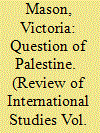

|
|
|
|
|
| Summary/Abstract |
While the gravity of the injustice and inequality experienced by Palestinians is now widely documented, evidenced, and acknowledged, when it comes to action the situation appears ‘impervious’ to international law and norms of global politics, with Israel largely enjoying impunity. This article argues that this state of affairs can be most coherently understood through a critical interdisciplinary emancipatory framework centred on ‘liminality’. Referring to situations and actors ‘betwixt and between’, the framework of liminality offers significant potential for understanding how particular actors and spaces are intentionally marginalised, disempowered, and silenced within global politics and international law. Furthermore, in revealing the root causes of liminality, and the inherent vulnerability of such spaces to contestation and subversion, the framework also opens up potential pathways of transformative emancipation. Applying the lens of liminality to Palestine, it is demonstrated that Palestinians have been deliberately corralled to a liminal space within international law and global politics in order to enable an expansionist Zionist/Israeli settler colonial enterprise. After exploring how Palestinian liminality manifests in global politics and international law, the article turns to a range of efforts to subvert Palestinian liminality and assesses prospects for a teleological emancipation for Palestinians.
|
|
|
|
|
|
|
|
|
|
|
|
|
|
|
|
| 16 |
ID:
174706
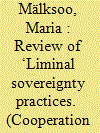

|
|
|
|
|
| Summary/Abstract |
The online publication of the article ‘Liminal sovereignty practices: Rethinking the inside/outside dichotomy’ moves away from the standard depiction of sovereignty as operating on the line between the inside and the outside of the state (Loh and Heiskanen, 2020). The authors seek to reconceptualize the said dividing line (border line) as a liminal space (border space) and, by extension, theorize the concept of liminality in greater depth and nuance. Sovereignty is accordingly taken to be grounded in three distinct spaces (the domestic society, the international realm and the liminal space between the two), loaded with various sovereignty practices. Liminality is theorized as an attribute of sovereignty. The authors offer a systematization of various ambiguous types of ‘borderline’ sovereignty, contesting the standard notions and practices of sovereignty to varying degrees. The article distinguishes between four distinct kinds of liminality: marginal (e.g., contested states); hybrid (e.g., indigenous peoples/tribal sovereignty); interstitial (e.g., non-state actors); and external (e.g., terrorists and anarchists) liminality – each with unique actors, practices and consequences for the concept of sovereignty.
|
|
|
|
|
|
|
|
|
|
|
|
|
|
|
|
| 17 |
ID:
174707
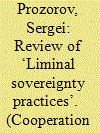

|
|
|
|
|
| Summary/Abstract |
I recommend that the article should be revised and resubmitted. This is a very well-written and clearly argued piece that offers a systematic and analytical treatment of the concept of liminality that the authors suggest as an alternative to the binary inside/outside thinking that characterizes both the traditional international relations (IR) theory and its post-structuralist critique that remains fixated on the dividing line between the inside and the outside, even as it affirms its contingency, fluidity, haziness, and so on. While the authors’ argument, particularly their typology of liminal practices, is very interesting and suggestive, I am not certain that it succeeds in solving the problems the authors claim it does, at least on the level they claim it does. Below I address three problems with the argument.
|
|
|
|
|
|
|
|
|
|
|
|
|
|
|
|
| 18 |
ID:
097727
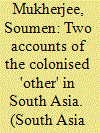

|
|
|
|
|
| Publication |
2010.
|
| Summary/Abstract |
Taking examples from South Asia, this article shows how British colonial knowledge about the non-European 'other' hinged substantially on the participation of sections of that other, especially in the context of liminal groups, for whom no ready standardised formula of identification was available. Development of a colonial episteme often involved active intervention from the colonised body, thereby dispelling any strict notion of coloniser-colonised alterity and mere top-down governance. This process of identity construction took place in several arenas and also involved negotiations in courts of law, where rival sections of the amorphous colonised body fought for competing ideals of selfhood. Complementing this legal construction were ethnographic formulations, internally diverse, and often relating to broader politico-intellectual concerns and debates of the Empire, at different planes in different ways. The article explicates their theoretical bases and practical modalities.
|
|
|
|
|
|
|
|
|
|
|
|
|
|
|
|
|
|
|
|
|